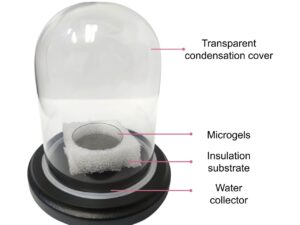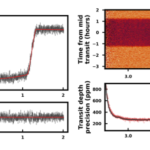2023-09-11 テキサス大学オースチン校(UT Austin)

◆この装置は、外に設置するだけで水を生成し、特に水が不足している地域の人々にとって革命的な解決策となる可能性があります。現在、研究者たちはこの技術を商業製品に転用し、世界中で低コストかつ携帯可能なクリーンな飲用水の供給手段として利用できるようにするために取り組んでおり、エチオピアなどの国々にとっては生活を変える可能性があります。
<関連情報>
- https://news.utexas.edu/2023/09/11/hot-summer-air-turns-into-drinking-water-with-new-gel-device/
- https://www.pnas.org/doi/abs/10.1073/pnas.2308969120
熱応答性ハイドロゲル中の水和を分子レベルで閉じ込め、効率的な大気中水分採取を実現。 Molecularly confined hydration in thermoresponsive hydrogels for efficient atmospheric water harvesting
Weixin Guan, Yaxuan Zhao, Chuxin Lei, and Guihua Yu
Proceedings of the National Academy of Sciences Published:September 11, 2023
DOI:https://doi.org/10.1073/pnas.2308969120
Significance
With increasing global demand for freshwater and the concurrent dwindling of traditional water resources, it’s imperative to explore sustainable alternatives for water supply. Atmospheric water harvesting (AWH), a potential solution, faces challenges due to the energy-intensive release of captured water. Addressing this issue, our study introduces the concept of molecularly confined hydration in thermoresponsive hydrogels, enabling more efficient water release at lower temperatures. This technique, when coupled with photothermal absorbers, harnesses solar energy, bolstering the sustainability of AWH. This advancement contributes to our understanding of hydrogel design for AWH and signifies a crucial step in the global efforts to mitigate the intensifying water scarcity crisis.
Abstract
Water scarcity is a pressing global issue, requiring innovative solutions such as atmospheric water harvesting (AWH), which captures moisture from the air to provide potable water to many water-stressed areas. Thermoresponsive hydrogels, a class of temperature-sensitive polymers, demonstrate potential for AWH as matrices for hygroscopic components like salts predominantly due to their relatively energy-efficient desorption properties compared to other sorbents. However, challenges such as limited swelling capacity due to the salting-out effect and difficulty in more complete water release hinder the effectiveness of conventional hydrogel sorbents. To overcome these limitations, we introduce molecularly confined hydration in thermoresponsive hydrogels by employing a bifunctional polymeric network composed of hygroscopic zwitterionic moieties and thermoresponsive moieties. Here, we show that this approach ensures stable water uptake, enables water release at relatively low temperatures, and exhibits rapid sorption–desorption kinetics. Furthermore, by incorporating photothermal absorbers, the sorbent can achieve solar-driven AWH with comparable water release performance. This work advances the design of AWH sorbents by introducing molecularly confined hydration in thermoresponsive hydrogels, leading to a more efficient and sustainable approach to water harvesting. Our findings offer a potential solution for advanced sorbent design with comprehensive performance to mitigate the freshwater crisis.



